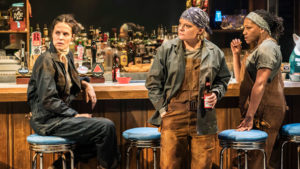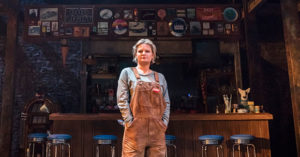Sweat- an important visceral play by Lynn Nottage.
[usr=5]
There is so much I could say about this play but I want to concentrate on the central story which concerns the deindustrialisation that happened in the US in the early 21st century. It’s something we in the UK are only too familiar with. Our government, like many others, moved the economy away from manufacturing, letting those jobs go to China, Mexico and other developing countries where labour was cheap.

In Sweat the action takes place in 2000 in Reading, Pennsylvania and is based on true events surrounding factory closures. Lynn Nottage has created complex believable characters and we see at first hand their sense of betrayal, loss and anger. They feel betrayed because generations had worked at the factory and displayed what they saw as loyalty. They lose their way of life and their sense of worth.
In a succession of scenes, the main characters meet up in a bar that looks as industrial as a factory. In particular we meet two good friends Tracey and Cynthia. At first all is well but we can see the seeds of what will happen. Unlike Tracey and her son Jason (Patrick Gibson) who see working on the line as their lives, Cynthia and her boy Chris (Osy Ikhile) aspire to get away from the grind of the factory floor. Chris plans to go to college, Cynthia would like to move into management.
Both women apply for a supervisor vacancy, Tracey just for the hell of it but Cynthia because she really wants it. When the more suitable Cynthia gets it, Tracey who’s white puts it about that Cynthia only got the job because she’s black- in other words, because of positive discrimination. Racism, it seems, is just waiting below the surface like sewer beneath a road. When the factory threatens jobs, the division between old friends just gets worse as does prejudice against any ethnic minority.

Tracey is repulsive. She’s undoubtedly the life and soul of the party but she’s also ignorant and blindly prejudiced. And very aggressive- Mike Tyson would hesitate to pick a fight with her. It’s a layered character brilliantly conveyed by Martha Plimpton. You are appalled by her but you know enough about her to recognise her as a fellow human and to realise her biggest problem is a lack of education, which leads to her inability to see the bigger picture, and her failure to see that her interest lies in unity not division.

When we go forward eight years, we see the long lasting devastating effects of job loss on individuals when a whole community becomes poor. Frankie Bradshaw’s set now represents the isolation of homes rather than the community of the bar. Clare Perkins breaks your heart as Cynthia who dreamed of improving her life and ends up used, abused and struggling to survive.
There is a shocking act of violence involving Jason and Chris that stems from the threatened factory closure. Perhaps Jason was always likely to resort to violence when under pressure but it is easy to see what happens as a metaphor for the blows against the establishment struck by working class people voting for Trump or Brexit.
Lynette Linton‘s direction is tight and the characters express themselves as physically as they do verbally. While the production might not be as visceral as it must have been in the cockpit of its original venue The Donmar, Sweat remains a harrowing, important experience. It brings home the shocking reality of the effect of deindustrialisation on people and communities. It also gives us an insight into why we are seeing such a rise in racism and populism.
Sweat can be seen at the Gielgud Theatre until 20 July 2019. Click here for information and tickets